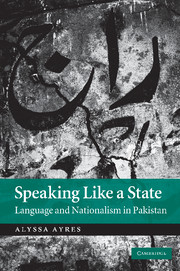Book contents
- Frontmatter
- Contents
- List of illustrations
- List of tables
- Acknowledgments
- Note on transliteration
- Introduction
- 1 Articulating a new nation
- 2 Urdu and the nation
- 3 The nation and its margins
- 4 The case of Punjab, part I: elite efforts
- 5 The case of Punjab, part II: popular culture
- 6 History and local absence
- 7 Bringing back the local past
- 8 Speaking like a state: language planning
- 9 Religion, nation, language
- 10 Conclusion
- Bibliography
- Index
4 - The case of Punjab, part I: elite efforts
Published online by Cambridge University Press: 25 August 2009
- Frontmatter
- Contents
- List of illustrations
- List of tables
- Acknowledgments
- Note on transliteration
- Introduction
- 1 Articulating a new nation
- 2 Urdu and the nation
- 3 The nation and its margins
- 4 The case of Punjab, part I: elite efforts
- 5 The case of Punjab, part II: popular culture
- 6 History and local absence
- 7 Bringing back the local past
- 8 Speaking like a state: language planning
- 9 Religion, nation, language
- 10 Conclusion
- Bibliography
- Index
Summary
Young Punjabi poets and writers are reinterpreting their own classical works and have reformulated the message of the mystic poetry of the great sufi poets of Punjab … as the poetry of resistance against unbridled and unjust authority … In so far as it is a step towards the rediscovery of the rational basis of the national identity, this movement is not anti-nationalist … Yet to be a Punjabi is to be as much a Pakistani as Punjab is an integral part of Pakistan.
–Partial text, Article 18 of Writ Petition No. 3603 of 1978 in the Lahore High Court, Fakhar Zaman son of (Retd) Major Muham-mad Zaman resident of 178-C Model Town, Lahore (Petitioner)On April 9, 1996, the Lahore High Court reached a judgment on a case that had been pending for eighteen years. Four Punjabi-language books (two novels and two collections of poetry) had been banned by executive order on charges of obscenity in 1978. The petitioner, author Fakhar Zaman, then filed the Writ Petition cited above, which refuted the obscenity charges in part by arguing that what was at stake was the freedom to develop Punjabi as a literary language, to retrieve the language of Punjab, the literature of Punjabi, and the history of Punjab from an abject and subservient status. This subservient status, according to the Writ Petition, came about as the result of all histories of the region having been written first from the perspective of the former British masters, and then from the perspective of an “obscurantist” and oppressive “minority elite.”
- Type
- Chapter
- Information
- Speaking Like a StateLanguage and Nationalism in Pakistan, pp. 67 - 86Publisher: Cambridge University PressPrint publication year: 2009



